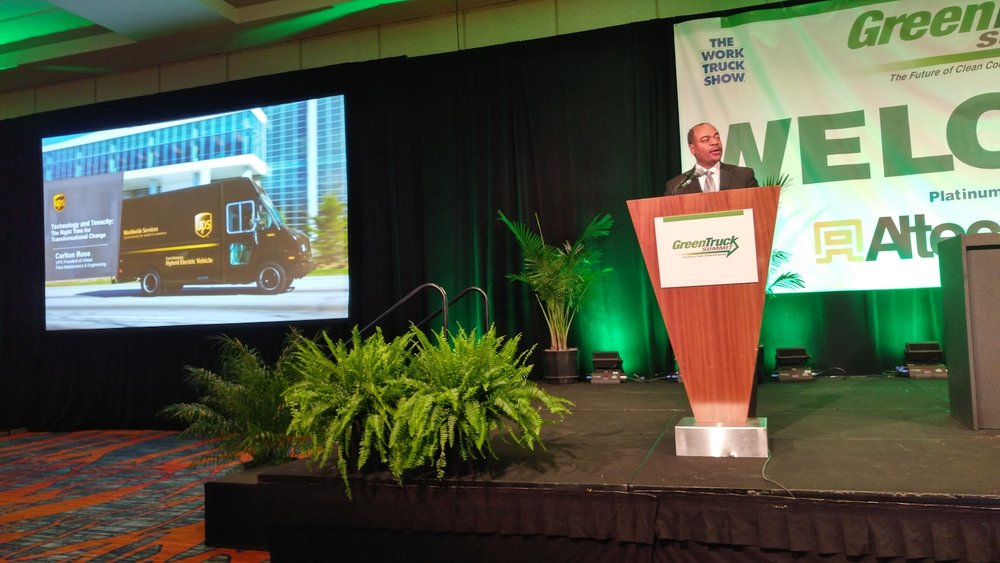
INDIANAPOLIS, Indiana. Electric is the future of commercial trucking, said Carlton Rose, but the industry is not there yet. Rose, president of global fleet maintenance and engineering for UPS (NYSE: UPS), told attendees at the Green Truck Summit in Indianapolis, Indiana, on Tuesday morning that UPS is committed to exploring all possible propulsion systems, but that ultimately, he believes electric will become the dominant option, with a caveat.
“I have one big problem with predictions,” he said during his keynote address, “they are wrong more than they are right. … [because] predictions rest on the assumption that the future is like the past.”
Rose oversees more than 340,000 global assets in his division, managing over 8,000 managers and supervisors and 454,000 employees.
“Fleets want solutions that work,” he noted later in his speech. “If the technologies don’t work, it doesn’t matter what they cost or how much in subsidiaries are available.”
Most of his speech was focused on the potential for electric, and he pointed out several predictions that he believes will contribute to an electric future. By 2050, 68 percent of the world’s population will live in cities, creating more congestion and environmental concerns, he said. The continuing rise of e-commerce – online orders have grown 12 percent annually three years in a row - is also driving change.
“We have become accustomed to getting what we want when we want,” Rose said of online ordering, adding that all these factors are leading to a growth in urban freight delivery, which is expected to grow more than 40 percent by 2050. This growth is also fueling greenhouse gas emissions, with heavy-duty and medium-duty trucks contributing 23 percent of those today.
“We can be part of the problem or part of the solution,” Rose said. “UPS wants to be part of the solution.”
UPS’ more than 1,000 electric and hybrid-electric fleet vehicles are just part of the company’s current approach, but Rose expects those numbers to grow.
“We’ve always been an early adopter of innovative technologies,” he said. Six percent of everything shipped globally moves through UPS’ system at some point, giving it the ability to help move markets. UPS was an early backer of the Tesla Semi electric tractor. Rose said that Tesla continues to insist it will start producing the truck “soon,” but it was Tesla’s entry to the market that has helped drive more options.
“Our goal is to get original equipment manufacturers (OEMs) entering the market and when Tesla came in, other OEMs started jumping in and that’s what we want, options,” Rose said.
Electric vehicles are still not the ideal solution, but they are a growing option, he added.
“Commercial electric trucks are still a work in progress,” Rose said, noting range anxiety, even at UPS, is a concern.
“On our electric fleet, range has certainly been an issue,” he said. “If you have a vehicle with a 100-mile range, you can’t send a driver out 51 miles because he won’t get back.”
The success of electric trucks remains the advancement of battery technology, improving charging infrastructure, and the ability to get “everybody to work together.” This includes fleets, manufacturers, utilities and regulators, Rose said.
Electric is not the only option UPS is studying in its Rolling Laboratory, Rose said, leaving the door open to future innovations. In fact, UPS currently operates over 6,000 natural gas vehicles.
“We play in all option and we do that on purpose,” he said. “We know that trying different propulsions, other people will get in and [those solutions] will improve.
“We’re a company that will not let perfect get in the way of good,” Rose added.
While he views electric as the future, he said that widespread adoption remains out of reach until electric vehicles can prove themselves, and even then, they may not be for all fleets.
“I know what works for UPS’ fleet won’t work in all fleets,” Rose said. “But we should try” to get all parties working together and letting OEMs and government know what works and what doesn’t.
Rose encouraged all those in attendance to proactively bring about change.
“Customer expectations are changing faster than ever before,” Rose said. “In today’s business world, it’s not enough to react to change, you must be leading the change, otherwise you won’t be around long. Solutions won’t just appear, we must be stubbornly forcing them.”
Source: https://www.freightwaves.com/news/equipment/electric-trucks-are-coming-says-ups-executive

No comments:
Post a Comment